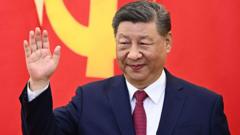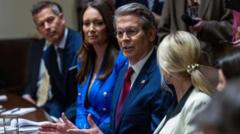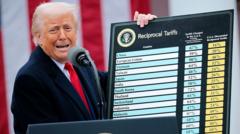President Trump's recent decision to eliminate the tariff exemption for low-value packages from China and Hong Kong may inadvertently decrease airfreight emissions linked to the fast-fashion industry, which has surged in the U.S. market.
Trump’s New Tariffs Could Unintentionally Reduce Fashion Industry Emissions

Trump’s New Tariffs Could Unintentionally Reduce Fashion Industry Emissions
An overview of President Trump's tariff changes impacting fast-fashion shipments from China, highlighting potential environmental benefits.
In a significant policy shift, President Trump announced new tariffs that will close existing loopholes affecting fast-fashion giants such as Shein and Temu, which have greatly benefited from the de minimis exemption allowing packages valued under $800 to enter the U.S. without tariffs. This change, particularly impacting shipments from China and Hong Kong, could have unexpected environmental benefits by reducing airfreight emissions tied to the fashion industry.
The de minimis exemption enabled a staggering 1.36 billion packages to enter the U.S. last year, with China as the primary source. Most of these packages traveled by air, which is 68 times more carbon-intensive compared to ocean shipping, as reported by the Climate Action Accelerator, a Swiss nonprofit specializing in climate issues. Consequently, closing this policy gap may contribute to a reduction in carbon emissions from the rapidly-growing fashion sector.
Globally, many nations have similar regulations allowing small shipments to bypass tariffs, with thresholds set considerably lower than the U.S. standard. For instance, Europe allows shipments up to 150 euros to cross duty-free, while Argentina permits deliveries valued less than $400 to be similarly exempt. Since 2016, the U.S. has maintained its $800 limit.
While these exemptions facilitate smoother customs processing and curb border congestion, they have also enabled foreign e-commerce platforms to undercut American retailers like Amazon and Walmart on price. Therefore, the new tariffs not only aim to recalibrate the market landscape for U.S. retailers but may also yield significant environmental impacts—an interesting twist in the broader narrative of global e-commerce and sustainability.





















